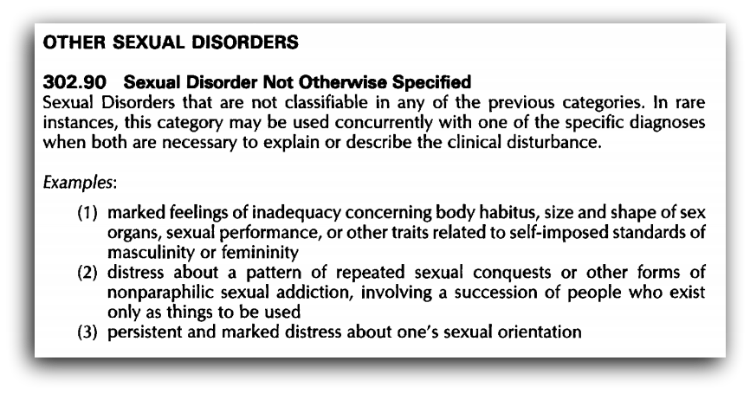Is it true, as one survey suggests, that 50% of Christian men and 20% of Christian women would say they are “addicted” to porn? Really? Has it gotten that bad in the church?
A recent study from Case Western Reserve University sheds some light on this subject. Researchers concluded that there is a strong relationship between religious belief and the perception that personal porn use is an “addiction.”
To be clear, the study did not see any relationship between religiosity to the actual use of porn. Christians don’t use porn any more or less than non-Christians (according to this study). Rather, a Christian who watches porn at a certain frequency is far more likely to say he or she is “addicted” than the non-religious person who uses porn at the same frequency.
Joshua Grubbs, the author of the study, commented, “We were surprised that the amount of viewing did not impact the perception of addiction, but strong moral beliefs did.”
The Church Needs to Speak Clearly to a Sexually Confused Culture
As far as critics are concerned, the answer is a relatively simple one: “What’s causing all the commotion about porn is not its use or misuse, but the rigid, prudish moral standard the dominates the Christian’s conscience. Loosen the moral standard and the perceived problem goes away.”
The first problem with this solution is that it is factually inaccurate. Whole online communities have cropped up in recent years (such as Reddit’s NoFap and PornFree groups), founded by and filled with ardently secular people who are experiencing porn-induced erectile dysfunction and talking about porn addiction as as serious problem.
Related: 10 Day Porn-Induced Erectile Dysfunction Recovery Challenge
The second problem with this solution is that this is unsustainable for the Christian. The church’s sexual ethic is not based on ever-changing psychological models and trends. It is based on revelation from the Living God, “with whom there is no variation or shadow of change” (James 1:17).
Still, the church needs to be ready with an answer before the watching world. How should we use the label of “addiction” when it comes to pornography—or should we use it at all? The need to address this question has never been greater because porn use is at an all-time high.
- One in eight searches online is for erotic content.
- More than a third of teenage boys say they’ve seen porn “more times than I can count.”
- More than two thirds of college age men and a fifth of college age women go online for sexual purposes every week.
If the church wishes to have dialogue with a pornified world, then the terms we use to talk about porn should be clear and honest.
Related: Who is Watching Porn in Church and What Can We Do About it?
Addiction vs. Compulsion vs. Dependence
It might be easy to blame the church for playing fast and loose with its terminology, but part of the reason for the ambiguity around the subject of addiction is that this has been a nebulous concept among psychiatrists and the rest of the medical community for several decades.
We can thank William Shakespeare for introducing the word “addiction” to the English language, but since its inception it has had a turbulent 400-year history.
In the field of addiction medicine, there has been a long-standing debate about the nature of compulsion vs. addiction. This debate is puzzling because “compulsion” is part of the definition of addiction (according to ASAM, the American Society of Addiction Medicine), yet there is no consistent usage of the terms across the board. We regularly speak of compulsive gambling and compulsive shopping, but not “compulsive drug use” or “compulsive drinking.” Any attempts to untangle the language issues or to develop a common framework have failed.
Similarly, there is considerable debate about the labels of addiction vs. dependence. When the revised third edition of the Diagnostic and Statistical Manual of Mental Disorders (DSM-III-R) was being edited, some committee members favored the label “addiction” when it came to drugs and alcohol because it more accurately portrayed a compulsive habit as distinguished from “physical” dependence (which can occur in anyone who takes medications that affect the central nervous system). Those who favored “dependence” felt it was less pejorative; it was a more neutral term that would not stigmatize substance abusers as having a disorder. In end the room was split, and the word “dependence” won over “addiction” by a single vote.
Sex Enters into Addiction Medicine
Sigmund Freud is famous for saying, “Masturbation is the one great habit that is a ‘primary addiction,’ and that the other addictions, for alcohol, morphine, tobacco, etc. only enter into life as a substitute and replacement for it.” Under Freud’s influence, in 1969 Sandor Rado believed drug addicts were accessing pleasure centers of the brain that were ultimately sexual in nature, using phrases like “pharmacotoxic orgasm” to get his point across. Indeed, it was some of these early pioneers of addiction medicine that believed all compulsions had a sexual root.
Many decades later, the pendulum has swung the other way.
Under the general diagnosis “Sexual Disorders Not Otherwise Specified,” the DSM-III-R added the concept of “sexual addiction” to its language for the first time. But only seven years later the DSM-IV (1994) removed the term due to “insufficient research.” In 2009 the term “hypersexual disorder” was proposed for the DSM-V, but this was ultimately rejected.

Much of the debate is centered around both the emotional force and clinical precision of words. Some sexologists, such as Eli Coleman in the late 1980s, prefer terms like “sexual compulsion” or “abusive behavior patterns”—seeing it as a variation of obsessive-compulsive disorder. For these researchers, “addiction” betrays a sort of seriousness that isn’t warranted. Patients can recover from compulsions, but one is “always recovering” from an addiction.
Still, the DSM-IV not only killed the language of “sexual addiction,” it cautioned against calling sexual behaviors “compulsive” as well because sex is inherently pleasurable—unlike OCD patients who derive no pleasure from their obsessions. Other medical professionals objected to this reasoning, believing the OCD definition should be expanded to include a spectrum of behaviors, including “sexual impulsions.”
When the American Medical Association was on the verge of declaring “addiction medicine” a recognized specialty, delegates asked David Smith, president of ASAM, “Is sexual addiction part of the field of addiction medicine?” He knew the medical community feared a slippery slope: would all perceived antisocial behaviors be placed in an addiction treatment context? Smith answered no, sex addiction is not part of addiction medicine. Later Smith commented that his response was as much political as it was clinical.
Why the ambivalence? On one hand, there is a fear in the field of sexual health that any conversation about sex addiction is just a playing into the hands of sex-negative self-help groups. The field of sexology generally focuses on empowering people sexually, not helping people curb their desires. “The unconditional acceptance of sexual desire was the starting point for sex therapy,” writes Dr. Patrick Carnes.
For others, there is the fear that the term “addiction” turns responsible agents into victims, and this is especially true in the criminal justice system. For 80 years, 12-Step communities have been founded on the idea of moral responsibility for one’s actions the need for personal accountability, yet when “sex addiction” is added to the mix there is a fear that this removes all responsibility.
In the face of such ambiguities, it is not difficult to see why the church—and the general public, for that matter—feel free to define the terms in way that make the most sense to them. The medical community certainly isn’t making sense of it for us.
Does Religion Make Us Addicts?
Despite the lack of diagnostic support, psychologists have attempted to explain and define what sex and porn addiction is. Many would agree that sex addiction is “the inability to regulate sexual behavior despite negative consequences.”
Under this definition, because negative consequences differ from person to person, the presence of addiction will vary from person to person. Take the devoted Christian who believes that viewing pornography is sinful, an offense to God, and a betrayal of his conscience. On the other hand, take a secularist who thinks nothing is wrong with watching porn, finds it liberating and enjoyable, and has no social context where his behavior is frowned upon. Suppose these individuals both viewed porn regularly—even every day. Suppose both found themselves compelled to watch it and both indulged whenever they had a chance. Under this definition of addiction, even if both are truly addicted, we could rightly say the Christian is addicted in a way the secularist is not: only the Christian is moving against the grain of perceived negative consequences and indulging in the behavior anyway.
In light of this it makes sense why more Christians would be likely to identify as addicts—they have more perceivable negative consequences to tangle with.
Neurology Enters the Discussion
Still, the inability to regulate behavior despite negative consequences isn’t the only trademark of addictive behavior. Ever since the mid-1970s, new understandings of the chemistry of the brain have opened up new language and new sets of data to talk about addictions.
In 1986, Harvey Milkman and Stan Sunderwirth described three primary neuropathways for the addictions:
- The Arousal Neuropathway – High excitement and intense emotions such as fear and extreme pleasure
- The Satiation Neuropathway – Relaxing or soothing behavior; analgesic, self-medicating, or numbing behavior; anxiety-reducing behavior
- The Fantasy Neuropathway – Escaping into unreality or denial of reality
Milkman and Sunderwirth went further to theorize that sex is perhaps the most powerful addiction because it transcends each of these primary pathways, offering arousal, satiation, and fantasy.
Neurology also begins to address the seemingly uncontrollable cravings of the addict. The more one masturbates to porn, the more dopamine is released in the brain. Eventually dopamine receptors and signals fatigue, leaving the viewer wanting more but unable to reach a level of satisfaction. This desensitization in turn impacts the prefrontal cortex. As dopamine receptors decline in the brain, so do the amount of neural cells in these prefrontal lobes. The decrease of blood flow to the prefrontal lobes causes what is called hypofrontality, which means the “executive control” center of the brain is weakened. As impulses, urges, and emotions surge from the mid-brain, the prefrontal region is too weak to regulate them, thus the addict feels his or her urges as compelling “needs” that must be satisfied.
The field of neurology has completely reshaped a modern definition of addiction given by the ASAM as “a primary, chronic disease of brain reward, motivation, memory, and related circuitry.” No longer is addiction merely measured by one’s subjective experiences. It is now something that can be mapped by brain scanners and shown in colorful MRI images.
Hard Questions About Addiction and Sin
When interfacing with the world, with church members, and with the medical community, should the church continue adopting the term “porn addiction,” and if so, when?
Christian counselor Brad Hambrick is right when he says that in dealing with subjects like this, it is better to start with a list of questions than a list of answers. The better our questions are, the more humbly we can approach these areas of uncertainty.
- Is “porn addiction”—or whatever we call it—a flaw in character or chemistry? Is this even the best way to frame the question? What do we lose when we fall into the trap of either-or thinking?
- Can we have a “weak” brain—easily given over to addictive tendencies—and yet have a “strong” soul—with a deep and genuine love for God? If we say “yes” to this question in areas like intelligence (i.e. having a low I.Q. but having strong faith), why would we say “no” about the matter of addiction?
- When do labels serve us well? When do labels serve us poorly?
- What other terms might be helpful for describing the phenomenon? Should we opt for terms born in the medical community (dependence, compulsion, etc.), or should we opt for more biblically rooted terms (slavery, transgression, etc.), or should we opt for both?
- How do we understand the tension between the present and future realities of the kingdom of God when it comes to our mental health? How much can we expect to remedy the effects of the Fall before Christ returns?
- Does the “addict” label help someone struggling with pornography to take responsibility and find help? Or does it become a core identity that holds them back from progress?
4 Positions: How Should the Church Speak of “Porn Addiction”?
Among those who discuss this issue in the church, there are (at least) four identifiable camps. You can, of course, find overlaps, but these tend to be the major positions. I’ve given them nicknames: (1) the Redeemers, (2) the Clinicians, (3) the Prophets, and (4) the Contextualists.
1. The Redeemers: Addiction to Self Is the Root of All Sin
There are some in the church who, regardless of the nuances in the diagnostic literature, think the term “addiction” should be usurped or “redeemed” by the church at large as something to describe all habitual sin. As these people see it, standard clinical stipulations of addiction are unhelpful, relegating “addicts” to those at the far end of the spectrum, when the word should apply to anyone who fails to stop sinful behavior—which is everyone.
By redeeming and reimagining the term “addiction,” churches can level the playing field among their members, breaking down the us-them mentality. When church members are taught that “addiction to self” is the root of all sin, then porn addicts, alcoholics, and drug addicts are not a stigmatized few—they are no longer a lonely group of perverts and lost causes. Rather they can be easily embraced by the body of Christ.
You may ask, “Why redeem the term ‘addiction’ from the culture and from medicine?” Why not, the Redeemers ask. It gives people a vivid picture of the seriousness of sin: something enslaving, habitual, and requiring the help of a Power greater than oneself.
2. The Clinicians: All Sin Is Serious, but Addiction Is Rare
There are others in the church who take their cues about addiction straight from the diagnostic literature and the medical community, and therefore believe phrases like “porn addiction” are overused in the church today.
For the Clinicians, addiction is defined narrowly by key indicators, when several or all of these factors are present:
- Tolerance: A markedly diminished sexual satisfaction over time when looking at porn
- Withdrawal: Showing symptoms of irritability, violent dreams, mania, insomnia, violent mood swings, paranoia, headaches, anxiety, and depression when going without porn
- Progression: Needing larger amounts of porn over a longer period of time to get the same high
- Unsuccessful quitting: No ability to cut down or control the use of porn
- Increased time: More and more time and effort is spent seeking out porn and recovering from its effects
- Sacrifice: Important social, occupational, or recreational activities are given up in order to use porn
- Stubbornness: Despite knowing the negative physical or psychological effects, porn use continues
The Clinicians see all porn use as sinful, and therefore serious, but not necessarily manifesting as an addiction. There are a variety of other psychological characteristics they might employ to describe one’s relationship to porn: compulsive, impulsive, abusive, self-medicating—all of which are miserable and serious problems—but are nonetheless not addiction.
The Clinicians see the “addict” label as harmful for those to whom it does not really apply because it comes with a long history of medical and therapeutic baggage, insinuating the addict has no control over his or her actions and requires specialized help. Clinicians don’t want to see Christians pathologize themselves needlessly and would like to see addiction language used minimally.
3. The Prophets: “Addiction” Is Confusing, Stick to Bible Terms
Some in the church want to see Christians get back to biblical categories for describing sin, no longer depending on modern psychiatric terms. Not only is there no universally recognized clinical definition of “addiction,” they argue, the term has a broad and ambiguous use in the culture. Calling something an “addiction” is confusing at best and deceptive at worst.
The Prophets rely on the Scriptures for their categories and nomenclature. It isn’t “addiction,” it is slavery to sin. Porn users don’t need to “recover,” they need to repent and be restored in by spiritual leaders. It isn’t “dependency,” it is idolatry. It isn’t “psychiatric help,” it’s discipleship and biblical counsel.
Don’t confuse Prophets with moralists. Prophets are not the just-stop-it crowd. They are not the suck-it-up crowd. They intimately understand there are a variety of heart attitudes, family histories, and environmental concerns that go into our porn obsessions. They know the church must give good counsel, restoration, love, and admonishment. But they also think biblical categories and terms are one of the primary means God uses renew the mind. Modern psychiatric terms, at best, only serve to distract us from what is really going on: sin, hardness of heart, and a dire need to surrender to God.
Even if one’s sin has led to a “medical” condition, such as a chronic disease of brain circuitry, Prophets are skeptical that recovery programs and communities offer any novel, medical solutions. In the end, those enslaved to porn must turn to God’s means of grace to find freedom.
4. The Contextualists: “Addiction” Is Helpful for Some But Not for Others
The term “addiction” has a broad use in the culture, not just in the medical community. For some the term simply means enjoying something greatly and spending a lot of time engaging in it (“I’m addicted to reading”). For others, the term invokes a image of a dimly lit church basement where men and women 20-years sober show up for an AA meeting and still introduce themselves as alcoholics.
Like it or not, addiction means different things to different people. The Contextualists say we need to recognize this, using the term when it is helpful and refraining from use when it is harmful. For some, calling the problem an “addiction” is a relief because it finally gives them a label that makes sense of the madness of their condition; they can finally move on and make progress. For others, it trivializes the problem as something medical and therefore excusable. For others, it imprisons them in hopelessness, for they believe that once you’re an addict, you’re always an addict.
Don’t confuse Contextualists for relativists. Viewing porn is sinful no matter how your slice it or what you call it. But Contextualists understand that words have power, and terms like “addiction” and “addict” can sometimes come with great potential or unexpected baggage. Since the medical community does not have a monopoly on these terms—as is evidenced by the colloquial use of “addiction”—the church has every right to appropriate the terms how it likes. But this, of course, must be done with great care and precision, because words have meaning.
Use “addiction” when the label will help, but refrain when it will harm.
A Call to Stand Together: Do Not Outsource Moral Authority
Like it or not, the term “porn addiction” has officially caught on in the church, but it is still taking shape. How it takes shape will depend on further dialogue and discussion.
Regardless of what camp we stand in, when churches use vague terms like “pornography addiction,” it is critical that we define our terms and aim towards charity to those who don’t see eye-to-eye with our definitions.
It is also critical, when employing patently psychological terms that we never “outsource” moral authority to the social sciences. In a study of the popular evangelical magazine Christianity Today from 1956 to 2010, Jeremy Thomas found that while outward opposition to pornography has remained steady and robust over the last 50 years, during this same time, evangelicals’ anti-pornography declarations have become increasingly secular. More than half a century ago, pornography was judged by the moral authority of Scripture. Today, more secular forms of moral authority are used, such as psychological health or humanistic conceptions of individual rights. This, Thomas says, is evidence that the church is outsourcing its moral authority.
The church must remain clear that pornography is not essentially wrong because it is addictive, but because of its titillating and deceptive message: it rips sexuality from its relational context and presents human beings not as creatures made in God’s image, but as sexual commodities, something to be bought and sold.
Pornography’s message is antithetical to the gospel of Christ which says: “This is my body, which is given for you” (Luke 22:19). Pornography says: “This is your body taken by me.”










Why did this conversation stop ? Why do christian groups that profess to help rarely delve into the depths of the
battle with lust. Mostly Bible study about discipline, obedience , etc. ,all good but never revealing the battle of depravity. My experience is once in a while a true moment comes to help the struggler but most the time its a lonely battle. I knew Playboy lust was a dead end before I was a christian. I hated it. I hated the false promises. I began to hate sex altogether but couldn’t leave it either. Finally I gave up and surrendered to God. I really thought it would all go away. Instead it just got worse , and made me desperate to find help but it was always every bodies secret sin. This was in the seventies. The church has changed a little but not what I hoped for. It’s still a lonely battle. Most accountability groups are like a 6 month program or something. Then everybody goes on to some other topic. Like now you should be all cured or something. The next thing I expect is to be told I am not sincere or I’m half hearted.
All the doubt makes joy hard to find.
And don’t look at my Alias “NoSoul” and think that I am not a believer, you know it says that we have to wait for the “Day of Resurrection”. Oh – and I got the grammar wrong in the last sentence of my post and it should be “these are” instead of “this is”. Thank you very much for letting me post my comment which shows the other side of life that remains denied.
Also, Christians use the “committing Adultery with their eyes” scripture a little too quickly when it comes to Television Media but they don’t see their husbands, boyfriends and sons checking out woman in real life. If you’re getting attracted to armpits, shoulders and legs at knee level, then you really need to be prayed for because that’s all they show on normal TV shows. Basically, its always when the girl on TV is beautiful, then she is a jezebel or devil, this is how Christian woman perceive it whenever they are jealous and its “Godly” or “Holy” if the woman is unattractive. And if the autocorrect spell checker corrects a word like “Jezebel” and puts a capital “J” in place of a little one, then suddenly, and out of nowhere, the ordinary Christian who does not know anything about anything and cannot sort out the problems in their everyday life – all of a sudden, becomes “Annointed” – and will say “Look how they are glorifying the the devil! – My Word – Don’t listen to this one! – You can see there is something wrong with this person just immediately -I can feel it in my spirit” Meanwhile its just the autocorrect and spell checker and now the sender looks like a full on sorcerer who can make the World turn in reverse and change the colour of the Sky and that’s how they got that big house and BMW. I hope everyone learns from this example because this is how Christians behave when they try to assert themselves.
Again, I’m just not sure what this has to do with the article.